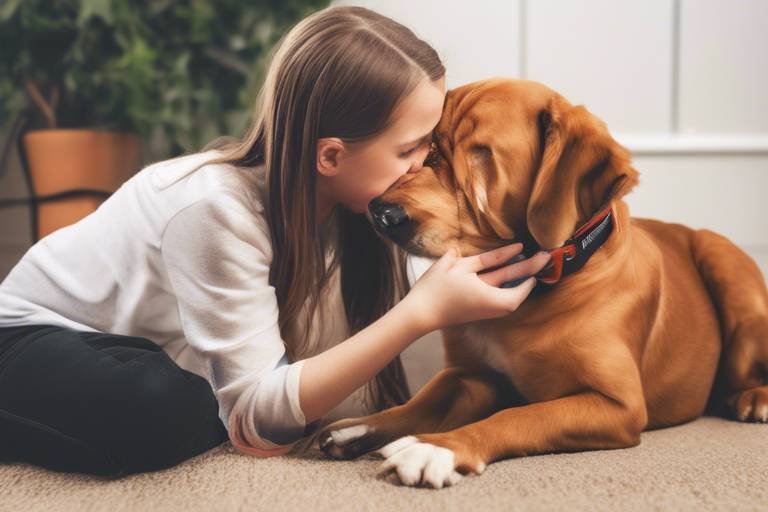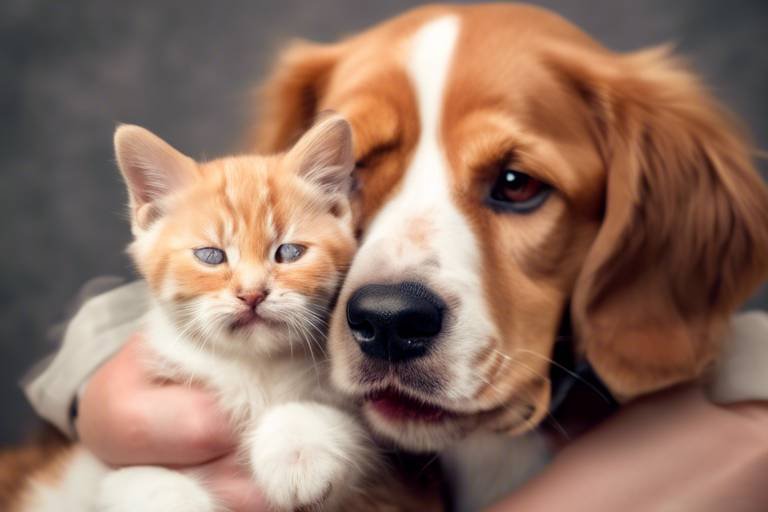The Role of Adoption in Promoting Animal Welfare
When we think about animal welfare, the first thing that often comes to mind is the importance of providing a loving home for pets in need. Adoption plays a crucial role in this mission, acting as a beacon of hope for countless animals awaiting their forever homes. By choosing to adopt, individuals and families not only save lives but also contribute to a larger movement aimed at reducing the number of homeless animals. This article will explore how adoption initiatives significantly impact animal welfare, the numerous benefits of adopting pets, and the vital role of community involvement in fostering a compassionate environment for animals in need.
Adoption is not just about bringing a pet into your home; it's about making a conscious choice to help alleviate the suffering of animals. Each year, millions of animals end up in shelters, often due to circumstances beyond their control, such as abandonment or neglect. Understanding the significance of adoption can inspire more people to consider this option instead of buying pets from breeders or pet stores. By adopting, you are making a statement that you value life and compassion over profit. This choice can create a ripple effect, encouraging others to follow suit and support local shelters and rescue organizations.
Adopting pets offers a treasure trove of benefits that extend beyond simply saving a life. For many, it’s about finding a loving companion who will bring joy and warmth into their homes. The financial aspect of adoption can also be a game-changer. Adoption fees are typically much lower than the costs associated with purchasing a pet, and many shelters include essential services such as vaccinations and spaying/neutering in their fees. This means that not only are you gaining a furry friend, but you’re also making a smart financial decision.
Every adoption is a lifeline for an animal in need. When you adopt, you are directly contributing to the reduction of euthanasia rates in shelters, which is a heartbreaking reality for many animals. Shelters often face overcrowding, and sadly, some animals are not given a chance to find a home. By adopting, you are providing a second chance for these animals, allowing them to experience love and care that they may have never known. It’s a powerful act that can transform not just the life of the pet but also the lives of their new family members.
Adoption is a vital solution to combat animal overpopulation. Every year, millions of animals are born into a world where there are not enough homes for them. By choosing to adopt, you are helping to alleviate the strain on shelters and promoting responsible pet ownership. This includes the importance of spaying and neutering pets, which helps control the population and ensures that fewer animals end up in shelters. It’s a collective effort that requires community support and awareness.
Bringing a rescued animal into your home can profoundly influence family dynamics and foster a culture of compassion and empathy. When children grow up with adopted pets, they learn valuable lessons about responsibility, kindness, and the importance of caring for those who cannot care for themselves. It’s more than just a pet; it’s a way to teach the next generation about love and respect for all living beings. The bond that forms between an adopted pet and their family is often unbreakable, creating memories and experiences that last a lifetime.
Community involvement is essential for promoting animal adoption. Local organizations, events, and volunteers play a significant role in creating a supportive network that helps animals find forever homes. By participating in adoption events, fostering pets, or volunteering at shelters, community members can make a tangible difference in the lives of animals. Additionally, spreading the word about adoption through social media and community outreach can inspire others to consider adopting instead of buying pets. Together, we can build a compassionate environment where every animal has the chance to find a loving home.
Despite the numerous benefits, adoption faces challenges such as misconceptions and stigma. Many potential adopters may have reservations about adopting shelter animals, which can prevent them from considering this option. Addressing these common barriers is crucial for promoting a culture of compassion and understanding.
One of the primary misconceptions about shelter animals is that they are problematic or unhealthy. In reality, many shelter pets are simply victims of circumstance and are often just as loving and trainable as pets from breeders. Shelters typically conduct health checks and provide vaccinations, ensuring that animals are ready for adoption. By debunking these myths, we can encourage more individuals to consider adopting a shelter pet.
Understanding and overcoming barriers to adoption is essential for promoting a culture of compassion. Strategies such as simplifying the adoption process, providing education on pet care, and offering support post-adoption can make the experience more accessible and appealing to a wider audience. By creating an inviting atmosphere and addressing concerns, we can encourage more people to open their hearts and homes to shelter animals.
- What should I consider before adopting a pet? Think about your lifestyle, the time you can dedicate, and whether you have the resources to care for a pet.
- Are shelter animals healthy? Yes! Shelters often conduct health checks and provide vaccinations before animals are put up for adoption.
- How can I get involved in my local shelter? You can volunteer, foster pets, or participate in community events to promote adoption.
- What if I have other pets at home? Many shelters can help you with introductions and provide guidance on how to integrate a new pet into your home.

The Importance of Adoption
Adoption plays a crucial role in reducing the number of homeless animals, and understanding its significance can inspire more people to consider adopting rather than buying pets from breeders or pet stores. Each year, millions of animals find themselves in shelters, often through no fault of their own. These animals are not just statistics; they are living beings with unique personalities and the potential to bring endless joy to a family. By choosing to adopt, you are not only giving a pet a second chance at life but also helping to alleviate the overwhelming problem of animal overpopulation.
When we talk about adoption, we must recognize the ripple effect it creates within communities. Each adoption story can inspire others to follow suit, fostering a culture of compassion and empathy. Imagine a community where every family has a furry friend—this not only enhances the lives of those families but also contributes to a healthier society. It encourages responsible pet ownership and promotes the idea that every animal deserves a loving home, regardless of their past.
Moreover, adopting pets from shelters or rescues is a powerful statement against the commercial pet trade, which often prioritizes profit over the well-being of animals. By choosing adoption, you are sending a message that you value life and compassion over consumerism. It’s a chance to break the cycle of breeding and contribute to a more humane approach to pet ownership.
To further illustrate the importance of adoption, let’s take a look at some statistics:
| Statistic | Impact |
|---|---|
| Approximately 6.5 million animals enter shelters each year | Adoption can significantly reduce this number |
| Only 1 in 10 dogs born in shelters find a permanent home | Every adoption increases the chances of survival for others |
| Adoption reduces the euthanasia rates in shelters | Every adopted pet means one less animal facing euthanasia |
In conclusion, the importance of adoption cannot be overstated. It is not just about finding a pet; it’s about making a conscious choice to support animal welfare and contribute to a more compassionate world. The next time you consider adding a furry friend to your family, remember that adoption is a powerful option that can change lives—both for the animals and for you.

Benefits of Adopting Pets
Adopting pets offers a myriad of benefits that extend beyond simply bringing a furry friend into your home. It's a life-changing decision that can enrich your life in ways you might not even expect. When you choose to adopt, you're not just gaining a companion; you're making a profound impact on the life of an animal in need. Imagine the joy of knowing that you've provided a loving home to a creature that had nowhere else to go. This act of kindness can lead to a rewarding relationship that enhances both your life and the life of your new pet.
One of the most compelling reasons to adopt is the opportunity to save lives. Every year, millions of animals enter shelters, many of whom are at risk of euthanasia due to overcrowding. By adopting, you are directly contributing to reducing these numbers and giving an animal a second chance at life. It's like being a superhero, swooping in to rescue those who are vulnerable and helping them find their forever homes.
Moreover, adopting a pet is often more economical than purchasing one from a breeder or pet store. Adoption fees are generally lower than the price tags associated with purebred pets, and many shelters include essential services such as vaccinations, microchipping, and spaying or neutering in the adoption fee. This means you can save money while still providing a loving home for a pet. In the long run, adopting can lead to significant savings, allowing you to allocate your resources to other important aspects of pet care, such as quality food, toys, and veterinary care.
Another significant benefit of adopting is the chance to find a loving companion. Pets have an incredible ability to bring joy and comfort into our lives. Whether it’s a dog wagging its tail to greet you after a long day or a cat curling up in your lap, the companionship of a pet can help alleviate feelings of loneliness and stress. Studies have shown that having a pet can improve mental health, reduce anxiety, and even lower blood pressure. It’s like having a furry therapist who’s always there to listen without judgment.
Furthermore, adopting pets fosters a sense of community and compassion. When you adopt, you’re not just changing the life of one animal; you're also inspiring others to consider adoption. Your decision can create a ripple effect, encouraging friends and family to explore the idea of bringing a shelter animal into their homes. This collective effort can significantly enhance the overall welfare of animals in your community. Think of it as planting a seed of kindness that grows into a garden of compassion.
Lastly, adopting a pet can lead to personal growth. Caring for an animal requires commitment, responsibility, and patience. These qualities can translate into other areas of your life, making you more empathetic and nurturing. Plus, the unconditional love that a pet offers can help you develop a deeper understanding of loyalty and companionship. It's a relationship that teaches you about giving and receiving love in its purest form.
In summary, the benefits of adopting pets are numerous and profound. From saving lives and reducing costs to fostering community and personal growth, adopting a pet is a decision that can change lives—both yours and the animal's. So, why not consider adoption? You might just find your new best friend waiting for you at a local shelter.
- What are the costs associated with pet adoption? Adoption fees can vary but generally include vaccinations, spaying/neutering, and sometimes even microchipping.
- Are shelter pets healthy? Many shelter pets are healthy and have undergone veterinary checks before adoption. It's a misconception that shelter animals are sick or problematic.
- How can I prepare my home for an adopted pet? Make sure to create a safe environment by removing hazards, setting up a comfortable space for your pet, and stocking up on essential supplies.
- What if I want a specific breed? Many breed-specific rescues exist, and you can often find purebred animals in shelters. It's worth checking local resources.
Saving Lives
Every time someone chooses to adopt a pet, they are not just gaining a furry friend; they are saving a life. Shelters across the country are filled with animals who have faced unimaginable hardships, and the reality is that many of them are at risk of euthanasia if they do not find a home soon. By adopting, you are giving these animals a chance to thrive in a loving environment. It's like being a superhero, swooping in to rescue those who cannot help themselves.
Consider this: in the United States alone, approximately 6.5 million companion animals enter shelters every year. Among these, around 1.5 million are adopted. This staggering number illustrates the urgent need for more people to step up and adopt. Each adoption is a beacon of hope, not just for the animal but for the community as well. When you adopt, you are actively participating in a solution that addresses the overpopulation crisis in shelters, which is a pressing issue that leads to the heartbreaking decision of euthanasia for many healthy animals.
Moreover, adopting a pet is not just about saving one life; it creates a ripple effect that can influence others in the community. When friends and family see the joy and love that comes from adopting, they may be inspired to do the same. It's like planting a seed of compassion that can grow into a forest of kindness. This is why sharing your adoption story can be so impactful. You never know who might be on the fence about adopting and could use your experience as a nudge to take that leap.
Here’s a quick look at the impact of adoption on animal welfare:
| Impact | Statistics |
|---|---|
| Animals Adopted Annually | Approximately 1.5 million |
| Animals Entering Shelters | About 6.5 million |
| Estimated Euthanasia Rate | Approximately 670,000 |
In conclusion, adopting a pet is more than just a personal choice; it is a vital contribution to the welfare of animals in need. It’s a chance to give an animal a second chance at life and a loving home. So, if you’re considering adding a pet to your family, think about adopting. You might just find that perfect companion who is waiting for you to bring them into your world.
- What types of pets can I adopt? Most shelters have a variety of animals, including dogs, cats, rabbits, and sometimes even birds and reptiles.
- Are shelter animals healthy? Yes! Most shelters ensure that animals are vaccinated and spayed/neutered before adoption.
- How can I prepare for a new pet? Research the specific needs of the animal you wish to adopt, prepare your home, and consider your lifestyle to ensure a good match.
- What should I expect during the adoption process? Expect an application process that may include a home visit, interviews, and sometimes a fee to cover medical expenses.
Reducing Overpopulation
When we talk about animal adoption, one of the most significant impacts it has is in . The reality is that countless animals end up in shelters every year, often due to irresponsible pet ownership and a lack of awareness about the importance of spaying and neutering. By choosing to adopt, you are not just giving a loving home to a pet in need; you are also actively participating in a solution to a much larger problem. It’s like being a superhero for animals—every time you adopt, you’re saving a life and making a statement against overpopulation.
Overpopulation in shelters leads to heartbreaking situations where animals are euthanized due to a lack of space and resources. In fact, according to the ASPCA, approximately 1.5 million shelter animals are euthanized each year in the United States alone. This staggering statistic highlights the urgent need for more people to consider adoption as a viable option. By adopting, you can help break this cycle and ensure that fewer animals face the tragic fate of being put down simply because they do not have a home.
To further illustrate the impact of adoption on overpopulation, let’s take a look at some key statistics:
| Year | Number of Animals Adopted | Number of Animals Euthanized |
|---|---|---|
| 2020 | 3.2 million | 1.5 million |
| 2021 | 3.4 million | 1.4 million |
| 2022 | 3.6 million | 1.3 million |
As you can see, the trend is moving in the right direction, but there is still much work to be done. Every adoption not only frees up space in shelters but also encourages responsible pet ownership. When people adopt, they often become advocates for spaying and neutering, which is crucial in controlling the pet population. It’s a ripple effect—one act of kindness can lead to a wave of positive change.
Moreover, adopting pets promotes a culture of compassion within communities. When families adopt, they often share their experiences, inspiring friends and neighbors to consider adoption as well. It’s like planting seeds of kindness; as these seeds grow, they can help cultivate a more humane society where animals are valued and cared for.
In conclusion, reducing overpopulation through adoption is not just a noble act; it's a necessary one. By choosing to adopt, you are not only saving a life but also taking a stand against the issues that lead to animal homelessness. So why not be part of the solution? Your decision to adopt can create a brighter future for countless animals in need.
- What is the first step in adopting a pet? The first step is to research local shelters and rescue organizations to find a pet that fits your lifestyle.
- Are shelter animals healthy? Yes! Most shelter animals are checked by veterinarians and are often vaccinated and spayed/neutered before adoption.
- What if I have other pets at home? Many shelters allow you to bring your current pets to meet potential adoptees to ensure a good match.
- Can I adopt a pet if I live in an apartment? Absolutely! Many pets, especially smaller breeds, thrive in apartment settings.
Fostering Compassion
Adopting a pet is not just about bringing a furry friend into your home; it's a profound way to foster compassion in both individuals and communities. When you choose to adopt, you are not only saving a life but also setting an example of kindness and empathy. Imagine the joy of watching a once-timid animal blossom into a loving companion; this transformation speaks volumes about the power of compassion. By opening your heart and home to a rescue animal, you create a ripple effect that encourages others to do the same.
When families adopt pets, they often experience a shift in their dynamics. Children learn valuable lessons in empathy, responsibility, and unconditional love. They witness firsthand the importance of caring for another living being, which can lead to a more compassionate worldview. This nurturing environment fosters a sense of community, as families often share their experiences with friends and neighbors, inspiring them to consider adoption as well.
Furthermore, adopting a pet can enhance community ties. Local shelters and rescue organizations frequently host events that bring people together, such as adoption fairs and fundraising activities. These gatherings not only promote animal welfare but also create opportunities for social interaction, allowing community members to connect over a shared passion for helping animals. In this way, adoption becomes a catalyst for building stronger, more compassionate communities.
In addition to personal connections, adopting pets can also inspire individuals to engage in broader efforts to support animal welfare. Many adopters become advocates for responsible pet ownership, participating in initiatives such as:
- Spaying and neutering programs
- Volunteering at local shelters
- Educating others about the benefits of adoption
Ultimately, the act of adopting a pet extends far beyond the individual level. It cultivates a culture of compassion that can transform communities, encouraging everyone to think about the welfare of animals in need. By fostering compassion through adoption, we not only change the lives of the animals we bring into our homes but also enrich our own lives and those of others around us.
Q: What are the benefits of adopting a pet?
A: Adopting a pet saves lives, provides loving companionship, and often comes with lower costs compared to purchasing from breeders. Additionally, adopted pets can be just as healthy and well-behaved as those bought from stores.
Q: Are shelter animals healthy?
A: Yes! Many shelter animals are healthy and have received vaccinations and spaying/neutering. Shelters often conduct health checks on their animals before adoption.
Q: How can I help promote animal adoption in my community?
A: You can volunteer at local shelters, share information about adoption events on social media, or even host a community gathering to educate others about the importance of adopting pets.
Community Involvement
Community involvement plays a pivotal role in promoting animal adoption and welfare. When individuals come together to support local shelters and rescue organizations, it creates a ripple effect that can lead to significant changes in the lives of countless animals. Imagine a neighborhood where everyone is actively participating in initiatives aimed at helping animals in need; this not only fosters a sense of belonging but also cultivates a culture of compassion. Community events, such as adoption drives, fundraising activities, and volunteer days, are excellent opportunities for people to engage directly with shelters and the animals they care for.
One of the most effective ways communities can contribute is by organizing adoption events. These events serve as a platform to showcase adoptable pets, allowing potential adopters to meet animals in a friendly and relaxed environment. Often, shelters partner with local businesses to create fun, family-friendly gatherings that spotlight the importance of adoption. For instance, a local park might host a "Paws for a Cause" day where families can enjoy food, games, and, of course, meet adorable pets looking for homes. Such events not only increase the visibility of shelter animals but also encourage community members to consider adoption as a viable option.
Moreover, local organizations can collaborate with schools and universities to create educational programs that raise awareness about animal welfare. By engaging young minds, we can instill values of empathy and responsibility towards animals from an early age. Workshops, presentations, and volunteer opportunities can help students understand the importance of spaying and neutering, the impact of overpopulation, and the joys of adopting pets. As these students grow into adults, they carry these lessons forward, potentially becoming advocates for animal welfare in their own right.
Additionally, volunteers are the backbone of any animal shelter. They dedicate their time and energy to walking dogs, socializing cats, and assisting with administrative tasks. This involvement not only helps shelters operate more efficiently but also fosters a strong sense of community. Volunteers often form bonds with the animals they care for, which can lead to increased adoption rates as they share their positive experiences with friends and family. Furthermore, when community members see their neighbors actively participating in animal welfare, it encourages them to get involved as well.
To summarize, community involvement is essential in promoting animal adoption and welfare. It creates a supportive network that helps animals find forever homes and fosters a culture of compassion. By participating in local events, volunteering at shelters, and educating others about the importance of adoption, each person can play a role in making a difference in the lives of animals in need. Together, we can build a community that not only cares for its animals but also thrives on the joy and fulfillment that comes from helping those who cannot help themselves.
- What can I do to help promote animal adoption in my community?
You can organize or participate in local adoption events, volunteer at shelters, or spread awareness through social media. - Are shelter animals healthy and well-behaved?
Many shelter animals are healthy and have been evaluated for behavioral issues. Shelters often provide medical care and training to ensure they are ready for adoption. - How can I educate my children about animal welfare?
Involve them in volunteering activities, take them to adoption events, and discuss the importance of kindness and responsibility towards animals.

Challenges in Adoption
Despite the numerous benefits of adopting pets, there are significant challenges that can deter potential adopters. One of the most prominent issues is the presence of misconceptions surrounding shelter animals. Many individuals believe that these animals are either problematic or unhealthy, which is far from the truth. In reality, shelters are filled with loving, healthy pets just waiting for a second chance. These misconceptions can stem from a lack of understanding or exposure to the realities of animal shelters, leading to a stigma that unfairly labels these animals.
Another challenge is the emotional barrier that some people face when considering adoption. The thought of adopting a pet from a shelter can be daunting, especially for those who may have never owned a pet before. They might wonder if they are prepared for the responsibilities that come with pet ownership or if they can handle the potential challenges of adopting an animal with a troubled past. This uncertainty can lead to hesitation, preventing many from taking that crucial step toward providing a forever home.
Moreover, the adoption process itself can sometimes be perceived as overly complicated or intimidating. Potential adopters may feel overwhelmed by the paperwork, interviews, and home checks that some shelters require. While these measures are in place to ensure the safety and well-being of the animals, they can inadvertently create barriers for those who are eager to adopt. Simplifying the adoption process could encourage more individuals to consider giving a shelter animal a loving home.
To tackle these challenges effectively, it is essential to foster a culture of compassion and understanding. Educational campaigns can help debunk myths about shelter animals, illustrating their true nature and the positive experiences of past adopters. By sharing heartwarming success stories and testimonials, shelters can change perceptions and encourage more people to open their hearts and homes to these deserving animals.
Additionally, community involvement plays a crucial role in overcoming these barriers. Local organizations and volunteers can collaborate to host events that promote adoption, such as adoption fairs or pet meet-and-greets. These events can create a welcoming atmosphere, allowing potential adopters to interact with animals in a low-pressure environment. By making the adoption experience more accessible and enjoyable, we can inspire more individuals to consider making a difference in an animal's life.
- What should I consider before adopting a pet? It's important to assess your lifestyle, living situation, and ability to commit time and resources to a pet.
- Are shelter animals healthy? Yes! Many shelter animals are healthy and have been checked by veterinarians before adoption.
- What is the adoption process like? The process typically includes filling out an application, an interview, and sometimes a home visit to ensure a good fit.
- Can I adopt a pet if I have other animals? Yes, many shelters allow you to bring your pets to meet a potential new family member to ensure compatibility.
Misconceptions About Shelter Animals
When it comes to adopting a pet, many people are held back by a series of misconceptions about shelter animals. One of the most common myths is that shelter pets are somehow problematic or unhealthy. This couldn’t be further from the truth! In fact, many animals in shelters are simply victims of circumstance—abandoned, lost, or surrendered due to no fault of their own. It’s essential to recognize that these animals often come with a rich history of love and companionship, just waiting for someone to give them a chance.
Another prevalent belief is that shelter animals are older and have behavioral issues. While it’s true that you can find older pets in shelters, there are also countless young, energetic animals looking for homes. Many of these pets are simply looking for a fresh start, and with proper training and love, they can become wonderful companions. Plus, adopting an older pet can be incredibly rewarding; they often come with a calmer demeanor and a profound appreciation for their new homes.
Furthermore, some people think that adopting from a shelter means they’ll have to deal with hidden costs or unexpected health issues. However, most shelters ensure that their animals are spayed or neutered, vaccinated, and often microchipped before adoption. This not only helps to reduce the overall cost of pet ownership but also significantly lowers the risk of future health complications. To illustrate this point, let’s take a look at a comparison:
| Cost Comparison | Buying from a Breeder | Adopting from a Shelter |
|---|---|---|
| Initial Adoption/Purchase Fee | Varies ($500-$3000) | Typically $50-$200 |
| Spaying/Neutering | Additional Cost ($200-$500) | Included |
| Vaccinations | Additional Cost ($100-$300) | Included |
| Microchipping | Additional Cost ($50-$100) | Often Included |
As you can see, adopting from a shelter can be not only a compassionate choice but also a financially savvy one. The misconception that shelter animals are less desirable or more expensive to care for is simply unfounded.
Lastly, let’s address the stigma surrounding certain breeds. Many people have preconceived notions about specific breeds, often unfairly labeling them as dangerous or untrustworthy. However, it’s crucial to remember that behavior is largely influenced by training and socialization, not just breed alone. By adopting a shelter animal, you can help dispel these myths and show the world that every pet, regardless of their background, has the potential to be a loving and loyal companion.
In conclusion, breaking down these misconceptions is vital for encouraging more people to consider adoption. By understanding the true nature of shelter animals, we can foster a more compassionate society that celebrates the beauty of giving a second chance to those in need.
- Are shelter animals really healthy? Yes, most shelter animals are spayed/neutered, vaccinated, and checked for health issues before adoption.
- What if I want a specific breed? Many shelters have breed-specific rescues, and you can often find purebred animals in need of homes.
- Can I return the pet if it doesn’t work out? Most shelters have return policies, but it’s best to discuss this with them before adopting.
- How can I help if I can’t adopt? You can volunteer, foster, donate, or spread the word about animals in need!
Overcoming Adoption Barriers
Adopting a pet should be a joyful experience, yet many potential adopters face barriers that can make the process daunting. One of the most significant challenges is the misconception that shelter animals are somehow less desirable than those from breeders or pet stores. This notion can stem from a lack of understanding about the true nature of shelter pets. In reality, many animals in shelters are simply victims of circumstance, such as being abandoned or surrendered due to their owner's inability to care for them. By sharing success stories and testimonials from happy adopters, we can change the narrative around shelter animals and help potential adopters see the wonderful companions they can be.
Another barrier is the perceived hassle involved in the adoption process. Many people believe that adopting a pet requires excessive paperwork, long waiting periods, and rigorous home checks. While it's true that responsible shelters want to ensure that their animals are going to loving homes, many organizations are streamlining their processes to make adoption more accessible. For instance, some shelters now offer same-day adoptions or virtual meet-and-greets, enabling potential pet owners to connect with animals from the comfort of their homes. By promoting these initiatives, we can help alleviate the fear of a complicated adoption experience.
Moreover, the financial aspect of pet ownership can deter individuals from adopting. Some might think that adopting a pet from a shelter is just as expensive as buying one from a breeder, but that's often not the case. Adoption fees typically cover initial vaccinations, spaying or neutering, and microchipping, which can save adopters a significant amount of money. To further assist potential adopters, shelters can offer transparent pricing and information on available financial assistance programs, ensuring that everyone has the opportunity to provide a loving home for a pet in need.
Lastly, education plays a crucial role in overcoming adoption barriers. Many people may not feel equipped to care for a pet, fearing that they lack the knowledge or experience needed to provide proper care. Shelters can bridge this gap by offering resources such as free training classes, informational workshops, and one-on-one consultations with staff. By empowering potential adopters with knowledge and support, we can foster a more confident and prepared pet ownership community.
In summary, overcoming adoption barriers requires a collective effort from shelters, communities, and potential adopters. By addressing misconceptions, streamlining processes, providing financial transparency, and offering educational resources, we can create a more inclusive environment that encourages pet adoption. After all, every animal deserves a loving home, and every person deserves the joy of having a furry companion.
- What should I expect during the adoption process? The process typically involves filling out an application, meeting the pet, and possibly a home visit. Each shelter has its own procedures, so it's best to check with them directly.
- Are shelter pets healthy? Yes, most shelter animals receive vaccinations and are spayed or neutered before adoption. Shelters often provide health records to adopters.
- Can I return the pet if it doesn't work out? Many shelters have return policies, allowing you to bring the pet back if it’s not a good fit. It's important to discuss this with the shelter during the adoption process.
- What if I have other pets at home? It's advisable to introduce your existing pets to the potential new pet in a controlled environment to ensure compatibility.
Frequently Asked Questions
- What is the importance of adopting pets from shelters?
Adopting pets from shelters is crucial because it helps reduce the number of homeless animals. Every adoption not only saves a life but also opens up space in shelters for other animals in need. It’s a win-win situation where you gain a loving companion while contributing to a larger cause!
- What are the benefits of adopting a pet?
Adopting a pet offers numerous benefits, including saving lives, finding a loving companion, and often reducing the costs associated with pet ownership. Many shelter animals are already vaccinated and spayed or neutered, which can save you money right off the bat!
- How does adoption help reduce overpopulation?
Adoption is a vital solution to animal overpopulation. By adopting instead of buying, you help alleviate the strain on shelters. Plus, responsible pet ownership through spaying and neutering can significantly reduce the number of unwanted animals.
- Can adopting a pet foster compassion in families?
Absolutely! Bringing a rescued animal into your home can teach empathy and compassion. It can change family dynamics in a positive way, encouraging kindness not just towards pets but towards all living beings.
- What are some common misconceptions about shelter animals?
Many people mistakenly believe that shelter animals are problematic or unhealthy. In reality, most shelter pets are loving, well-behaved, and just in need of a second chance. They often come from loving homes but ended up in shelters due to circumstances beyond their control.
- How can I overcome barriers to pet adoption?
Understanding and addressing barriers to adoption is essential. This can involve educating yourself about the adoption process, visiting shelters, and talking to staff about any concerns. Many shelters also provide resources to make the process easier and more appealing!
- How can my community get involved in promoting pet adoption?
Community involvement is key! Local organizations can host events, fundraisers, and awareness campaigns. Volunteers also play a vital role in fostering animals and spreading the word about the importance of adoption. Every little bit helps!



















